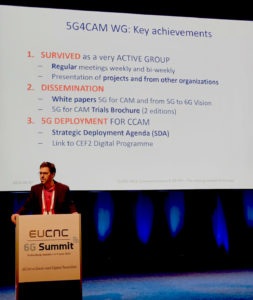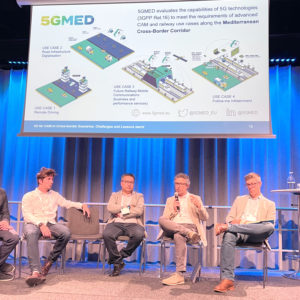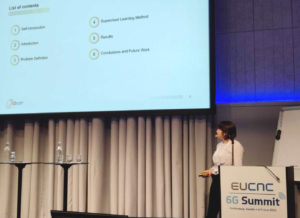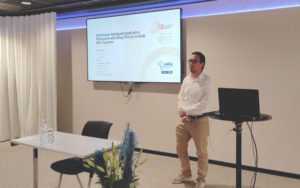
Keep up to date with our innovative initiatives.
Sign up here
Representatives from the i2CAT Foundation have actively participated in the last edition of the European Conference on Networks and Communications (EuCNC) and the 6G Summit, two of the top European conferences in communication networks, hosted in Gothenburg (Sweden) from the 6th to 9th June. The motto for EuCNC & 6G Summit 2023 has been “6G for a Green and Digital Transition” to highlight the excellent potential of 6G technologies to address most of the societal needs identified by the United Nations Sustainable Development Goals (UN SDGs), targeted for 2030. i2CAT has contributed to the conference by sharing some advances in 5G and 6G with applications in the fields of Connected Automated Mobility, Space Communications and Edge Computing, as well as discussing the lessons learnt in the 5G European R&I Programme (the 5G Public-Private Partnership), which can be useful to steer the new 6G R&I Programme, the so-called Smart Networks and Services Joint Undertaking (SNS-JU).


Jesus Alonso-Zarate during its intervention
Dr. Jesus Alonso-Zarate, Director of R&I Strategy and Policy in Europe at i2CAT, intervened in the session “5G-PPP – The value generated for Europe”, in which a dedicated panel of experts who have been profoundly involved in the governing bodies of the 5G-PPP Programme provided their insight into its execution, the obtained results, and the lessons learned so that the continuation framework, the 6G SNS JU, will provide even better results. On March 2023, Dr. Jesus Alonso-Zarate was elected by the members of the 6G Industry Association (6G-IA) to occupy one of the 16 seats that conform the Governing Board of the 6G-IA, representing the voice of the academic sector on this body which, in its turn, represents the voice of the private sector in the SNS JU.


Francisco Vázquez Gallego participated in the session “5G for CAM in cross-border scenarios: challenges and lessons learnt”
Dr. Francisco Vázquez Gallego, manager of the V2X research line and technical manager of the European-funded 5GMED project, participated in the session “5G for CAM in cross-border scenarios: challenges and lessons learnt”, in which researchers who have led some of the 5G for Connected Automated Mobility (CAM) research projects under the 5G-PPP Programme (in calls ICT-18 andICT-53) discussed the main challenges encountered along the projects’ execution, as well as the solutions devised and used to overcome them. They also outlined the lessons learnt from a technical perspective (5G network coverage, 5G performance, network validation) and those related to the business and governance models.


Estel Ferrer during its paper presentation
Estel Ferrer, from the Distributed Artificial Intelligence research area of i2CAT, presented the paper entitled “Inter-Satellite Link Prediction for Non-Terrestrial Networks Using Supervised Learning”. In this paper, the authors s propose an autonomous solution based on Supervised Learning that allows heterogeneous satellites in circular polar Low-Earth Orbits to predict their encounters, given the orbital elements and assuming isotropic antenna patterns. The goal is to achieve autonomous cooperation between heterogeneous satellites and minimise the Distributed Space Systems (DSS) energy consumption.


Juan Sebastián Camargo presenting the paper “DQN-Based Intelligent Application Placement with Delay-Priority in Multi MEC Systems”
Juan Sebastián Camargo, a research member of the Software Networks area at i2CAT, presented the paper “DQN-Based Intelligent Application Placement with Delay-Priority in Multi MEC Systems”. In this study, researchers propose a method based on Machine Learning technologies that enables ultra-low latency communications in 5G Multi-access Edge Computing (MEC). The method has been simulated over a series of MEC scenarios and has shown a success rate of up to 96%, optimising the delay in the long term.
Finally, Dr. Daniel Camps, Director of the Mobile Wireless Internet area of i2CAT also attended the conference, and participated in the various discussions that this yearly conference offers to its participants.
EuCNC is a key event in the European ecosystem and has become a unique meeting point for those researchers and organisations who lead the path towards the design of future communication networks and their smart services.